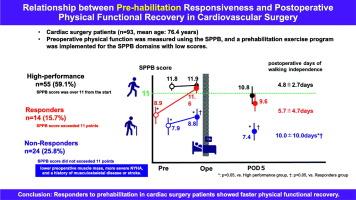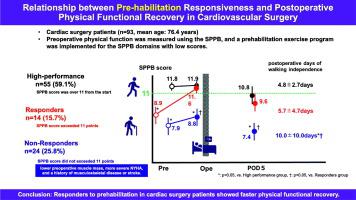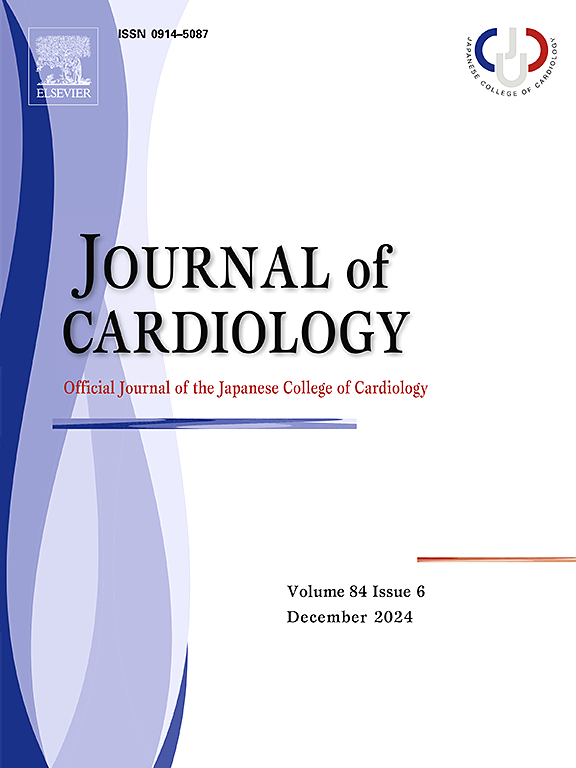心血管手术术前康复反应能力与术后身体功能恢复之间的关系。
IF 2.6
3区 医学
Q2 CARDIAC & CARDIOVASCULAR SYSTEMS
引用次数: 0
摘要
背景:本研究的目的是探讨心脏手术患者术前康复反应性与术后身体功能恢复之间的关系:本研究旨在探讨心脏手术患者对术前康复训练的反应能力与术后身体功能恢复之间的关系:这项回顾性队列研究共纳入 93 名心脏手术患者(平均年龄:76.4 岁)。术前使用短期体能测试(SPPB)对患者的身体功能进行了测量,并针对得分较低的 SPPB 领域实施了术前康复锻炼计划。其中,SPPB评分从康复训练开始时超过11分且在手术前一天仍超过11分的患者被定义为高功能组,SPPB评分从康复训练开始时提高2分或以上且超过11分的患者被定义为响应组。手术前SPPB评分不超过11分者为无应答组。对各组的特征和术后身体功能恢复情况进行了调查:结果:术前康复期间未发生严重不良事件。术前康复的平均天数为 5.4 天。与无应答组相比,有应答组的术后身体功能改善更快,独立行动的时间更短。无应答组的术前骨骼肌指数较低、术前纽约心脏协会分级较严重、有肌肉骨骼疾病或中风史:结论:心脏手术患者中存在对术前康复有反应者和无反应者。对康复训练有反应的心脏手术患者身体功能恢复得更快。要确定哪种类型的术前康复对心脏手术患者术后身体功能的恢复更有效,还需要进一步的研究。本文章由计算机程序翻译,如有差异,请以英文原文为准。


Relationship between prehabilitation responsiveness and postoperative physical functional recovery in cardiovascular surgery
Background
The purpose of this study was to examine the relationship between responsiveness to prehabilitation and postoperative recovery of physical function in cardiac surgery patients.
Methods
Ninety-three cardiac surgery patients (mean age: 76.4 years) were included in this retrospective cohort study. Preoperative physical function was measured using the Short Physical Performance Battery (SPPB), and a prehabilitation exercise program was implemented for the SPPB domains with low scores. Among the patients, those whose SPPB score was over 11 from the start of prehabilitation and remained over 11 on the day before surgery were defined as the high-functioning group, and those whose SPPB score improved by 2 points or more from the start of prehabilitation and exceeded 11 points were defined as the responder group. Those whose SPPB score did not exceed 11 immediately before surgery were classified as non-responders. The characteristics of each group and postoperative recovery of physical function were investigated.
Results
There were no serious adverse events during prehabilitation. Mean days of prehabilitation was 5.4 days. The responder group showed faster improvement in postoperative physical function and shorter time to ambulatory independence than the non-responder group. The non-responder group had lower preoperative skeletal muscle index, more severe preoperative New York Heart Association classification, and a history of musculoskeletal disease or stroke.
Conclusion
There were responders and non-responders to prehabilitation among cardiac surgery patients. Cardiac surgery patients who respond to prehabilitation had faster recovery of physical function. Further research is needed to determine what type of prehabilitation is more effective in postoperative recovery of physical function in cardiac surgery patients.
求助全文
通过发布文献求助,成功后即可免费获取论文全文。
去求助
来源期刊

Journal of cardiology
CARDIAC & CARDIOVASCULAR SYSTEMS-
CiteScore
4.90
自引率
8.00%
发文量
202
审稿时长
29 days
期刊介绍:
The official journal of the Japanese College of Cardiology is an international, English language, peer-reviewed journal publishing the latest findings in cardiovascular medicine. Journal of Cardiology (JC) aims to publish the highest-quality material covering original basic and clinical research on all aspects of cardiovascular disease. Topics covered include ischemic heart disease, cardiomyopathy, valvular heart disease, vascular disease, hypertension, arrhythmia, congenital heart disease, pharmacological and non-pharmacological treatment, new diagnostic techniques, and cardiovascular imaging. JC also publishes a selection of review articles, clinical trials, short communications, and important messages and letters to the editor.
 求助内容:
求助内容: 应助结果提醒方式:
应助结果提醒方式:


